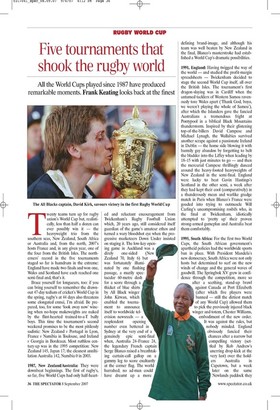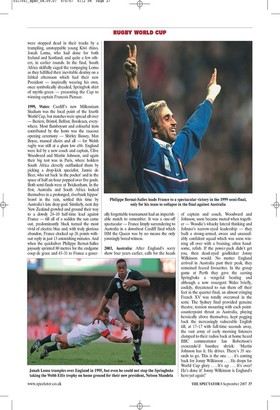Five tournaments that shook the rugby world
All the World Cups played since 1987 have produced remarkable moments. Frank Keating looks back at the finest wenty teams turn up for rugby union's World Cup but, realistically, less than half a dozen can ever possibly win it — the heavyweight trio from the southern seas, New Zealand, South Africa or Australia and, from the north, 2007's hosts France and, in any given year, one of the four from the British Isles. The northerners' record in the five tournaments staged so far is humdrum in the extreme: England have made two finals and won one, Wales and Scotland have each reached one semi-final and, that's it.
Brace yourself for longueurs, too: if you can bring yourself to remember the drawnout 47-day tedium of cricket's World Cup in the spring, rugby's at 44 days also threatens some elongated ennui, I'm afraid. Be prepared, too, for some 'look away now' wincing when no-hope makeweights are nuked by the flint-hearted trained to a T bully boys. This time the tournament's second weekend promises to be the most pitilessly sadistic: New Zealand v Portugal in Lyon, France v Namibia in Toulouse, and Ireland v Georgia in Bordeaux. Most ruthless century-up was in the 1995 competition: New Zealand 145, Japan 17; the cleanest annihilation Australia 142, Namibia in 2003.
1987, New Zealand/Australia: They were downbeat beginnings The first of rugby's, so far, five World Cups had only half-hearted and reluctant encouragement from Twickenham's Rugby Football Union which, 20 years ago, still considered itself guardian of the game's amateur ethos and turned a wary bloodshot eye when the progressive marketeers Down Under insisted on staging it. The low-key opening game in Auckland was a direly one-sided (New Zealand 70, Italy 6) but was fortunately illuminated by one flashing passage, a mazily spectacular 60-metre dash for a score through a thicket of blue shirts by All Black winger John Kirwan, which enabled the tournament to announce itself to worldwide television newsreels — a resplendent opening number even bettered in Sydney at the very end of a genuinely epic semi-final when, Australia 24—France 24, the legendary French captain Serge Blanco raised a breathtaking curtain-call gallop on a gammy leg to score exultantly at the corner flag. The world hurrahed; no ad-man could have dreamt up a more defining brand-image, and although his team was well beaten by New Zealand in the final, Blanco's masterstroke had established a World Cup's dramatic possibilities.
1991, England: Having twigged the way of the world — and studied the profit-margin spreadsheets — Twickenham decided to stage the second World Cup itself, all over the British Isles. The tournament's first dragon-slaying was in Cardiff when the untamed tacklers of Western Samoa ravenously tore Wales apart (Thank God, boyo, we weren't playing the whole of Samoa'), after which the Islanders gave the fancied Australians a tremendous fright at Pontypool in a biblical Black Mountains thunderstorm. Inspired by their glistening top-of-the-billers David Campese and Michael Lynagh, the Wallabies survived another scrape against a passionate Ireland in Dublin — the home side blowing it with barmily gay abandon by forgetting to belt the bladder into the Liffey when leading by 18-15 with just minutes to go — and then the mercurial Campese thrillingly danced around the heavy-footed heavyweights of New Zealand in the semi-final. England were lucky to beat Gavin Hastings's Scotland in the other semi, a week after they had kept their cool (comparatively) in a thunderously mean and warlike grudge match in Paris when Blanco's France were goaded into trying to outmuscle Will Carling's uncompromising rosbifs who, in the final at Twickenham, idiotically attempted to 'pretty up' their proven strong-armed gameplan and Australia beat them comfortably.
1995, South Africa: For the first two World Cups, the South African government's apartheid policies had the worldwide sports ban in place. With President Mandela's new democracy, South Africa were not only hosts but determined to surf on the new winds of change and the general waves of goodwill. The Springbok XV grew in confidence through the competition, more so after a seething, stand-up brawl against Canada at Port Elizabeth (after which five players were banned — still the dirtiest match of any World Cup) allowed them to pick the previously injured black winger and totem, Chester Williams, embodiment of the new order. It was against the rules, but nobody minded. England obviously fancied their chances after a narrow but compelling victory (settled by Rob Andrew's unerring drop-kick at the very last) over the holders Australia in Capetown, but a week later on the same Newlands paddock they were stopped dead in their tracks by a trampling, unstoppable young Kiwi rhino, Jonah Lomu, who had done for both Ireland and Scotland, and quite a few others, in earlier rounds. In the final, South Africa skilfully caged the rampaging Lomu as they fulfilled their inevitable destiny on a fabled afternoon which had their new President — inspiredly wearing his own, once symbolically dreaded, Springbok shirt of myrtle-green — presenting the Cup to winning captain Francois Pienaar.
1999, Wales: Cardiff's new Millennium Stadium was the focal point of the fourth World Cup, but matches were spread all over — Beziers, Bristol, Belfast, Bordeaux, everywhere. Most flamboyant and colourful item contributed by the hosts was the raucous opening ceremony — Shirley Bassey, Max Boyce, massed choirs and all — for Welsh rugby was still at a glum low ebb. England were led by a new coach and captain, Clive Woodward and Martin Johnson, and again their big test was in Paris, where holders South Africa cleverly outflanked them by picking a drop-kick specialist, Jannie de Beer, who sat back 'in the pocket' and in the space of half-an-hour popped over five goals. Both semi-finals were at Twickenham. In the first, Australia and South Africa locked themselves in a prolonged, riverbank hippos' brawl in the rain, settled this time by Australia's late drop goal. Similarly, next day New Zealand growled and ground their way to a dowdy 24-10 half-time lead against France — till all of a sudden the sun came out, predominantly black turned the most vivid of electric blue and, with truly glorious abandon, France clocked up 26 points without reply in just 13 astonishing minutes. And when the quicksilver Philippe Bemat-Salles joyously sprinted 80 metres for the endgame coup de grace and 43-31 to France a generally forgettable tournament had an imperishable match to remember. It was a one-off spectacular — France limply surrendering to Australia in a downbeat Cardiff final which HM the Queen was by no means the only yawningly bored witness.
2003, Australia: After England's sorry show four years earlier, calls for the heads of captain and coach, Woodward and Johnson, soon became muted when together — Woodie's whacky lateral thinking and Johnno's narrow-eyed leadership — they built a strong-armed, aware and unassailably confident squad which was soon winning all over with a bruising, often handsome, relish. If the power-pack didn't get you, then dead-eyed goalkicker Jonny Wilkinson would. No matter England arrived in Australia past their peak, they remained feared favourites. In the group game at Perth they gave the cursing Springboks a vengeful beating and although a now resurgent Wales briefly, cockily, threatened to run them off their feet in the quarter-final, an almost cringing French XV was totally overawed in the semi. The Sydney final provided genuine theatre, tension mounting with each pointcounterpoint thrust as Australia, playing heroically above themselves, kept pegging back the increasingly vulnerable English till, at 17-17 with full-time seconds away, the vast army of early morning listeners clamped to their radios back at home heard BBC commentator Ian Robertson's crescendo'd banshee shriek: 'Martin Johnson has it. He drives. There's 35 seconds to go. This is the one . . . it's coming back for Jonny Wilkinson . . . He drops for World Cup glory . . . It's up . . . It's over! He's done it! Jonny Wilkinson is England's hero yet again!'




































































 Previous page
Previous page